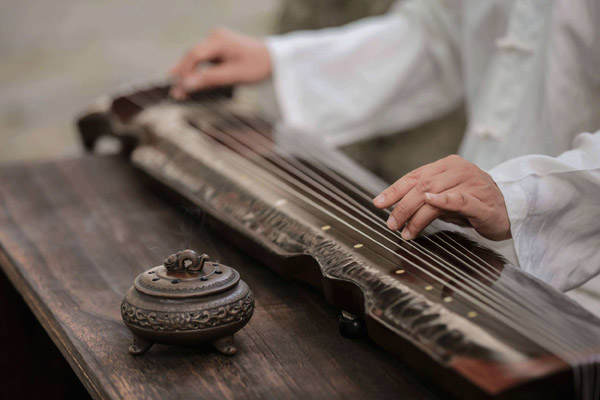
(PHOTO BY WANG JING/CHINA DAILY)
Like most of us, they have to make a living in the here and now, but the vocation of a select group of professionals is tightly bound to the past
In one room, with tools of various kinds and sizes hanging on the walls, Sui Yiyang stands by a table on which lie two pieces of wood with frames of the musical instrument the guqin that he has been working on for many months. In another room he brushes raw lacquer on the frames of a guqin patiently over and over again.
"Usually it takes about two years to finish one," he says.
Sui, 32, toils in his studio to create the perfect guqin, the ancient traditional Chinese instrument that has a rich history of more than 3,500 years.
The studio, tucked away in a yard near Guangqumen, in central Beijing, is about 300 square meters, and Sui has worked and lived there for seven years. He shares the yard with Xu Kangyan, a calligrapher, He Song, an ink painting artist, and Ma Chiye, an independent filmmaker.
Sui learned the rare skill of guqin making from Han Tingyao, now 85, who was born in Beijing and graduated from Tsinghua University in 1960. Han is the third-generation guqin master of Jiuyi Qinpai, one of the guqin performance styles titled Jiuyi, created by Yang Zongji (1863-1933), a scholar and guqin musician. The second-generation guqin master of Jiuyi Qinpai was Guan Zhonghang (1896-1972). Sui is the fourth generation of Jiuyi Qinpai.
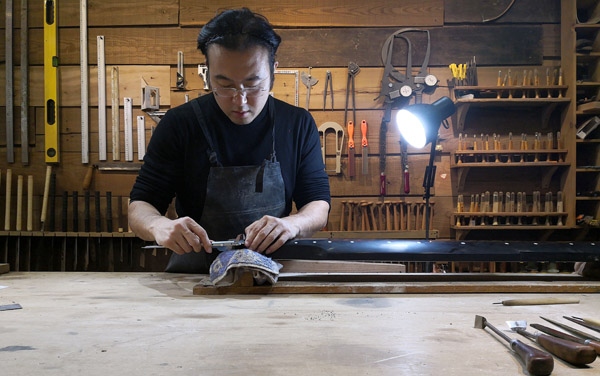
Sui Yiyang, guqin maker in Beijing.[PHOTO BY WANG JING/CHINA DAILY]
With Han, Sui learned that the simple-looking guqin is regarded as the "father of Chinese music" and favored by famous Chinese scholars such as Confucius and renowned poets such as Li Bai.
"Guqin is not just a musical instrument," Sui says. "It's full of history and knowledge. There are 3,360 pieces of music for guqin, and when you look into the background of how each piece was composed, such as the politics and popular culture of the dynasty of the time, you are learning Chinese history."
Sui says he made a guqin to mark Han's birthday last year, which Han says he will keep as a "family treasure".
Sui, born in Chengde, Hebei province, learned guitar, drum and bass as a teenager, and it was a trip to Inner Mongolia autonomous region with his father about 12 years ago that introduced him to guqin.
Sui recalls that before the seven-hour drive from Beijing to Inner Mongolia, he bought a collection of CDs of traditional Chinese musical instruments, hoping to add a bit of light relief to what was shaping up as a tedious trek.
The first recording he played was of a guqin, and for Sui, who was unfamiliar with its rich history, the seven-stringed plucked instrument stroked a responsive chord immediately.
"The sound of the guqin is so elegant, and it's totally different from the Western musical instruments I learned from childhood, such as guitar and keyboard," Sui says. "When I was a teenager my biggest dream was to play guitar like those rock bands from the West. But then I started questioning that dream because I wanted to be original and to play Chinese music.
"Guqin is the right musical instrument for me; I feel connected to it."
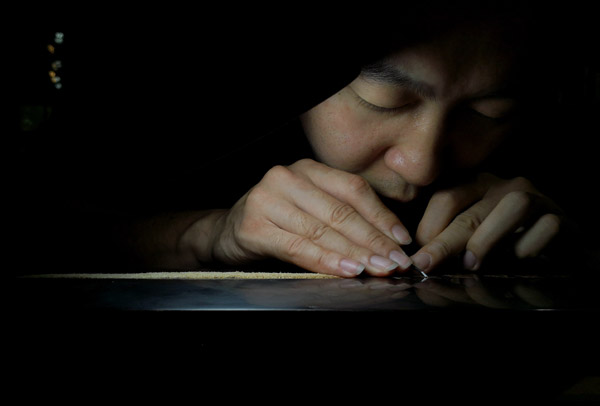
Sui Yiyang, guqin maker in Beijing.[PHOTO BY WANG JING/CHINA DAILY]
Then, after returning to the capital, he founded a guqin training school for amateur students and started learning the musical instrument with teachers from Beijing's music conservatories.
Thanks to his experience with guitar, Sui soon mastered the techniques, but at the time it was just a hobby.
After graduating from a military school in Beijing he joined his father's road engineering company.
"I had stable income but I was unhappy with what I was doing. I wanted to do something I really enjoyed, so I quit my job."
In 2009 he set up his own guqin making studio, on the outskirts of the capital.
With savings from his first job he kept his studio running for three years before he received his first guqin order in 2011 and moved his studio to downtown that year.
The price of a guqin depends on what it is made of and its sound, the range being from 150,000 yuan ($22,388) to 250,000 yuan.
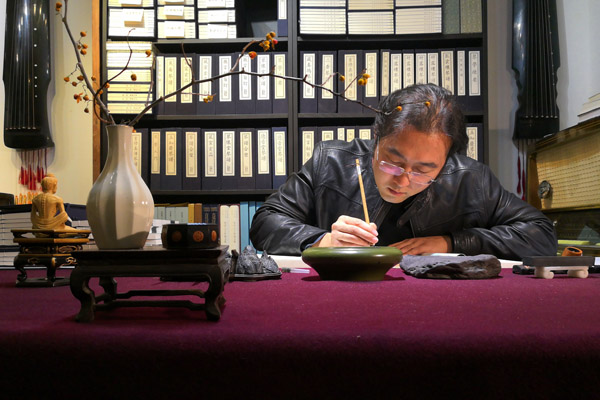
For Sui Yiyang, guqin is more than a musical instrument, and it's full of history and knowledge.[PHOTO BY WANG JING/CHINA DAILY]
Sui travels nationwide and even abroad to buy high-quality materials and tools. The money he makes just covers his rent and the cost of materials for future orders, he says.
Wood is crucial in making the instrument. He travels to places in southern China such as Fujian and Jiangxi provinces to buy wood. Once the wood arrives in Beijing, two thirds of it has to be discarded because it is no longer suitable as a result of the change in temperature and humidity, he says.
He also travels to Rentoushan, a village of Maoba township in Lichuan city, Hubei province, to buy raw lacquer, which is used to protect the guqin from corrosion. To get to the village he has to walk about 10 kilometers because the village has no road connections.
The local farmers collect raw lacquer from lacquer trees based on China's 24 solar terms. From xiazhi, or summer solstice, to hanlu, or cold dew, only about 120 days are suitable for collecting the lacquer.
"Young people don't want to stay in the village to collect raw lacquer because there's no money in it," Sui says. "The youngest raw lacquer farmer from that village is more than 60 years old and the oldest is nearly 90 years old."
In traveling to Rongchang district in Chongqing to buy xiabu (a type of Chinese linen that Chinese wore in summer in ancient times), he has found that only elderly people adhere to the traditional techniques of making xiabu. Xiabu is also used to protect guqin. Covering it with xiabu prevents the instrument from cracking.
"Guqin-making requires patience and maintaining commitment to high quality because all the materials determine the sound of the musical instrument," Sui says.
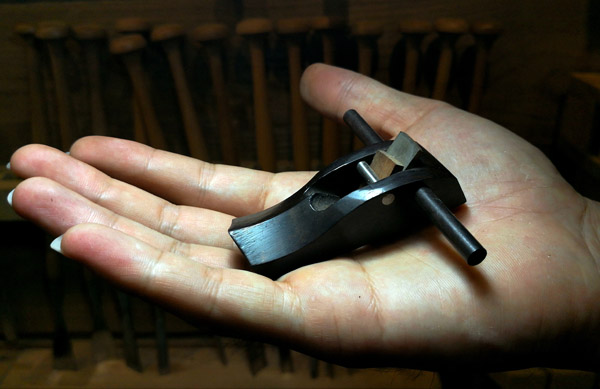
For Sui Yiyang, guqin is more than a musical instrument, and it's full of history and knowledge. [PHOTO BY WANG JING/CHINA DAILY]
While traveling to buy materials, he also takes pictures and videos of elderly people who learned their skills and techniques from their relatives.
"Young people rarely get a glimpse into the lives of those people, but they possess something valuable and traditional, and it may die one day," Sui says.
Compared with the regular jobs that some of his friends and relatives have, Sui's work seems to be a little offbeat, and he says there are only about 20 independent guqin makers in China.
"I sometimes wonder about devoting myself to this line of work, because I am so different to my friends. But I don't want to give up my dream. Most of the time I work alone in the studio and I hear about what is going on in the world from radio."
His favorite pastime apart from playing guqin is going to the movies and listening to classical music.
Sui, an only child, says his parents and grandparents are open-minded about his choice of being a guqin maker.
"My mother worries about me because my income is so unreliable. But she is happy for me because I am doing what I love."
Even though independent guqin makers are rare in China, the instrument is gaining more and more attention.
In 2003 it was added to the Masterpieces of the Oral and Intangible Heritage of Humanity by UNESCO, which drew more attention to the instrument and more support from audiences and government.
In 2008 Chen Leiji played the guqin at the opening ceremony of the Olympic Games in Beijing, bringing it to a global audience.
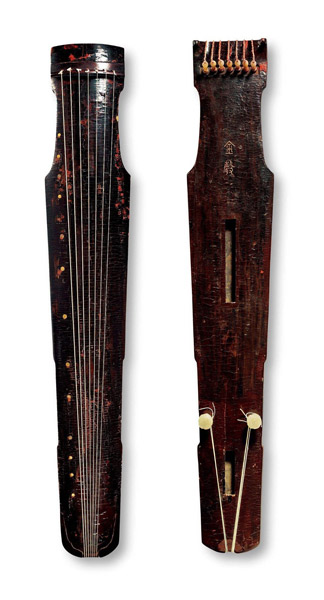
[Photo provided to China Daily]
In 2010 a guqin that was owned by Emperor Huizong (1082-1135) of the Northern Song Dynasty fetched 137 million yuan in an auction in Beijing, setting the highest record ever for a musical instrument. The following year, also in Beijing, a guqin of the Tang Dynasty (618-907) was sold at auction for 115 million yuan.
As the guqin regains recognition in China, the number is gradually increasing.
Sui has been invited to give lectures at the National Museum of China about the guqin for college students and museum visitors.
"I have three dreams before I die: to have a private guqin museum, to exhibit my guqin making products, and to publish a book about guqin making. I don't want to live my life in vain. I want to leave at least one work, which can be called legacy."


